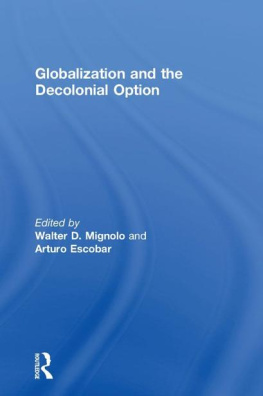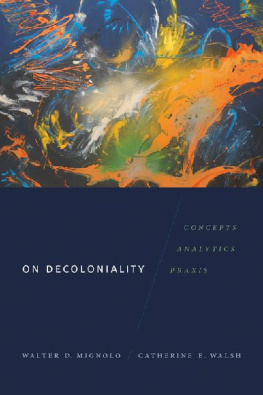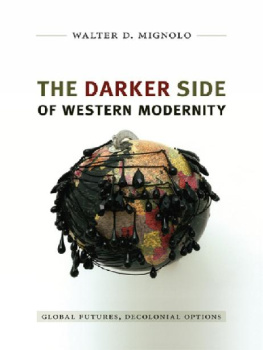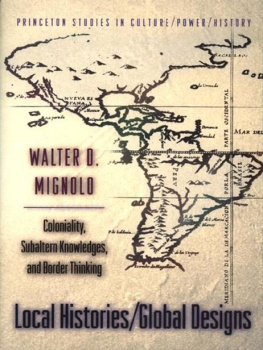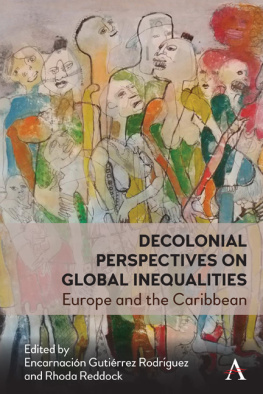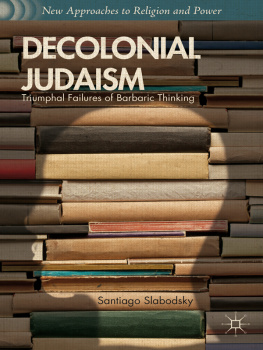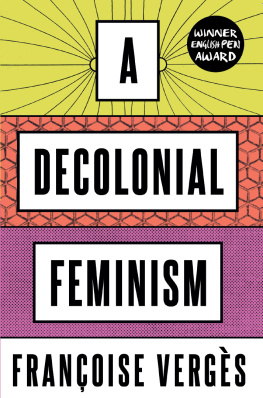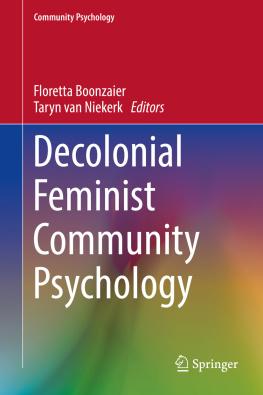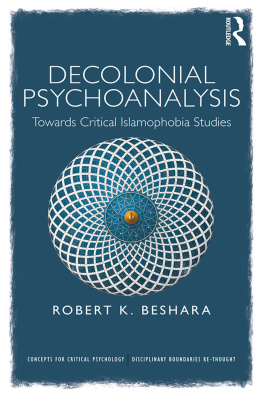Walter D. Mignolo - Globalization and the Decolonial Option
Here you can read online Walter D. Mignolo - Globalization and the Decolonial Option full text of the book (entire story) in english for free. Download pdf and epub, get meaning, cover and reviews about this ebook. year: 2013, publisher: Taylor and Francis, genre: Politics. Description of the work, (preface) as well as reviews are available. Best literature library LitArk.com created for fans of good reading and offers a wide selection of genres:
Romance novel
Science fiction
Adventure
Detective
Science
History
Home and family
Prose
Art
Politics
Computer
Non-fiction
Religion
Business
Children
Humor
Choose a favorite category and find really read worthwhile books. Enjoy immersion in the world of imagination, feel the emotions of the characters or learn something new for yourself, make an fascinating discovery.
- Book:Globalization and the Decolonial Option
- Author:
- Publisher:Taylor and Francis
- Genre:
- Year:2013
- Rating:3 / 5
- Favourites:Add to favourites
- Your mark:
- 60
- 1
- 2
- 3
- 4
- 5
Globalization and the Decolonial Option: summary, description and annotation
We offer to read an annotation, description, summary or preface (depends on what the author of the book "Globalization and the Decolonial Option" wrote himself). If you haven't found the necessary information about the book — write in the comments, we will try to find it.
Globalization and the Decolonial Option — read online for free the complete book (whole text) full work
Below is the text of the book, divided by pages. System saving the place of the last page read, allows you to conveniently read the book "Globalization and the Decolonial Option" online for free, without having to search again every time where you left off. Put a bookmark, and you can go to the page where you finished reading at any time.
Font size:
Interval:
Bookmark:

This is the first book in English profiling the work of a research collective that evolved around the notion of coloniality, understood as the hidden agenda and the darker side of modernity and whose members are based in South America and the United States. The project called for an understanding of modernity not from modernity itself but from its darker side, coloniality, and proposes the de-colonization of knowledge as an epistemological restitution with political and ethical implications.
Epistemic decolonization, or de-coloniality, becomes the horizon to imagine and act toward global futures in which the notion of a political enemy is replaced by intercultural communication and towards another rationality that puts life first and that places institutions at its service, rather than the other way around.
This book is profoundly inter- and trans-disciplinary, with authors writing from many intellectual, transdisciplinary, and institutional spaces.
This book was published as a special issue of Cultural Studies.
Walter D. Mignolo is William H. Wannamaker Professor of Romance Studies, Professor in the Program of Literature and Adjunct in Cultural Anthropology. He is also Director of the Center for Global Studies and the Humanities at Duke University and Associated Researcher, Universidad Andina Simon Bolivar, Quito, Ecuador.
Arturo Escobar is Kenan Distinguished Professor of Anthropology, and Adjunct in the Department of Geography and of Communication, at the University of North Carolina in Chapel Hill.
Decolonial Option
Edited by Walter D. Mignolo and
Arturo Escobar

First published 2010 by Routledge
2 Park Square, Milton Park, Abingdon, Oxon, OX14 4RN
Simultaneously published in the USA and Canada
by Routledge
711 Third Avenue, New York, NY 10017
Routledge is an imprint of the Taylor & Francis Group, an informa business
First issued in paperback 2013
2010 Taylor & Francis
Typeset in Perpetua by Value Chain, India
All rights reserved. No part of this book may be reprinted or reproduced or utilised in any form or by any electronic, mechanical, or other means, now known or hereafter invented, including photocopying and recording, or in any information storage or retrieval system, without permission in writing from the publishers.
British Library Cataloouing in Publication Data
A catalogue record for this book is available from the British Library
ISBN13: 978-0-415-54971-4
Walter D. Mignolo
I The Emergence of An-Other-Paradigm
Anbal Quijano
Arturo Escobar
Ramn Grosfoguel
Catherine Walsh
II (De)Colonization of Knowledges and of Beings
Nelson Maldonado-Torres
Freya Schiwy
III The Colonial Nation-States and the Imperial Racial Matrix
Javier Sanjins
Agustin Lao-Montes
Jos David Saldvar
IV (De)Coloniality at Large
Manuela Boatc
Zilkia Janer
Madina Tlostanova
V On Empires and Colonial/Imperial Differences
Santiago Castro-Gomez
Walter D. Mignolo
Maria Lugones
Arturo Escobar
Manuela Boatc is currently an Assistant Professor in the Department of Sociological Theory at the University of Eichstat in Germany. Her research interests include political sociology, world-system analysis, gender and violence, and postcolonial studies. Among her recent publications are From Neoevolutionism to World-Systems Analysis: The Romanian theory of Forms Without Substance (2003); Peripheral Solutions to Peripheral Development, Journal of World-Systems Research, vol. 11, no. 1, 2005; and Knocking in Europe's Door: Romanian Academia Between Communist Censorship and Western Neglect, SAQ, vol. 105, no. 3, 2006. Semiperipheries in the World-System. Reflecting Eastern European and Latin American Experiences, in Journal of World-Systems Research, vol. XII, no. 2, 2006.
Santiago Castro-Gmez is Associate Professor of Philosophy at the Universidad Javeriana in Bogot, Colombia. He is also Associate Researcher at the Insituto PENSAR at the same university. He received his PhD in philosophy from the Johann Wolfgang Goethe Universitat in Frankfurt, Germany. Among his recent books are Crtica de la razn latinoamericana (1996); La postcolonialidad explicada a los nios (2005) and La hybris del punto cero (2005).
Arturo Escobar is Professor of Anthropology and Director, Institute of Latin American Studies, University of North Carolina, Chapel Hill. His main interests are: political ecology, the anthropology of development, social movement theory, and science and technology studies. Over the past ten years, he has worked closely with several social movements in the Colombian Pacific and with the Rome-based Society for International Development (SID) on projects on globalization, culture, women, environment, and place.
Ramn Grosfoguel is a Sociologist and a Professor in the Ethnic Studies Department at UC-Berkeley. He has published many articles on the Political Economy of the World-System and on Caribbean Migrants in Western Europe and the United States. He is the author of Colonial Subjects (University of California Press, 2003).
Zilkia Janer is working on a critical history of culinary thought from a translocal perspective. She has published The Geopolitics of Culinary Knowledge (New Delhi) and In Search of a High-Cuisine (Kathmandu). Janer is also preparing a manuscript on Latino food culture for Greenwood Press. She is the author of Puerto Rican Nation-Building Literature: Impossible Romance (University Press of Florida, 2005) and teaches Latin American literature and culture at Hofstra University.
Agustin Lao-Montes teaches at the Department of Sociology of the University of Massachusetts at Amherst where he is also affiliated with the Center for Latin American, Caribbean, and Latino Studies, and with the Afro-American Studies Program. He has written extensively in a variety of fields including world-historical sociology, decolonial critique, social movements, cultural studies, and urban studies. He co-edited Mambo Montage: The Latinization of New York and is working on a manuscript tentatively titled Afro-Latina/o Diasporas: Black Movements and Racial Politics in the Americas.
Mara Lugones is Professor of Philosophy and Director of the Inter-disciplinary Research Center in Philosophy, Interpretation and Culture at the University of NewYork at Binghamton, focussing on Decolonial Thinking (http://cpic.binghamton.edu/decolonial.html). She is a popular educator and philosopher and teaches also at the Escuela Popular Nortea, a popular education center and in the Comparative Literature department, at Binghamton. Lugones is the author of Pilgrimages/Peregrinajes: Theorizing Resistance Against Multiple Oppressions (Rowman and Littlefield, 2003). She is finishing two books, Intimate Inter dependencies: Theorizing Collectivism; and Radical Multiculturalism.
Nelson Maldonado-Torres is Assistant Professor of Comparative Ethnic Studies in the Department of Ethnic Studies at the University of California, Berkeley and former Postdoctoral Fellow in the Center for Global Studies and the Humanities at Duke University. He works on theories and philosophies that address problems and questions related to the intersection of knowledge, ethics and politics on the one hand, and race, gender, nation, and empire on the other, particularly in connection with critical theory, phenomenology, postcolonial studies, and modern religious thought. He has published several articles and is working on two book-length projects:
Font size:
Interval:
Bookmark:
Similar books «Globalization and the Decolonial Option»
Look at similar books to Globalization and the Decolonial Option. We have selected literature similar in name and meaning in the hope of providing readers with more options to find new, interesting, not yet read works.
Discussion, reviews of the book Globalization and the Decolonial Option and just readers' own opinions. Leave your comments, write what you think about the work, its meaning or the main characters. Specify what exactly you liked and what you didn't like, and why you think so.

